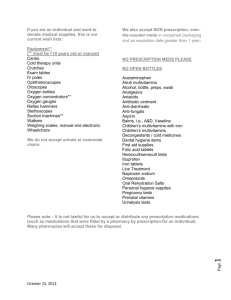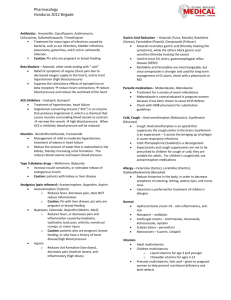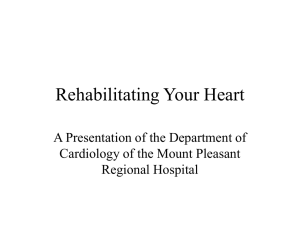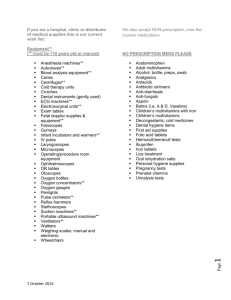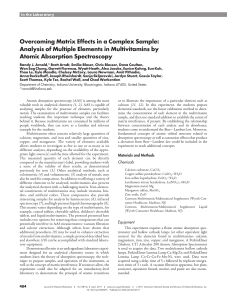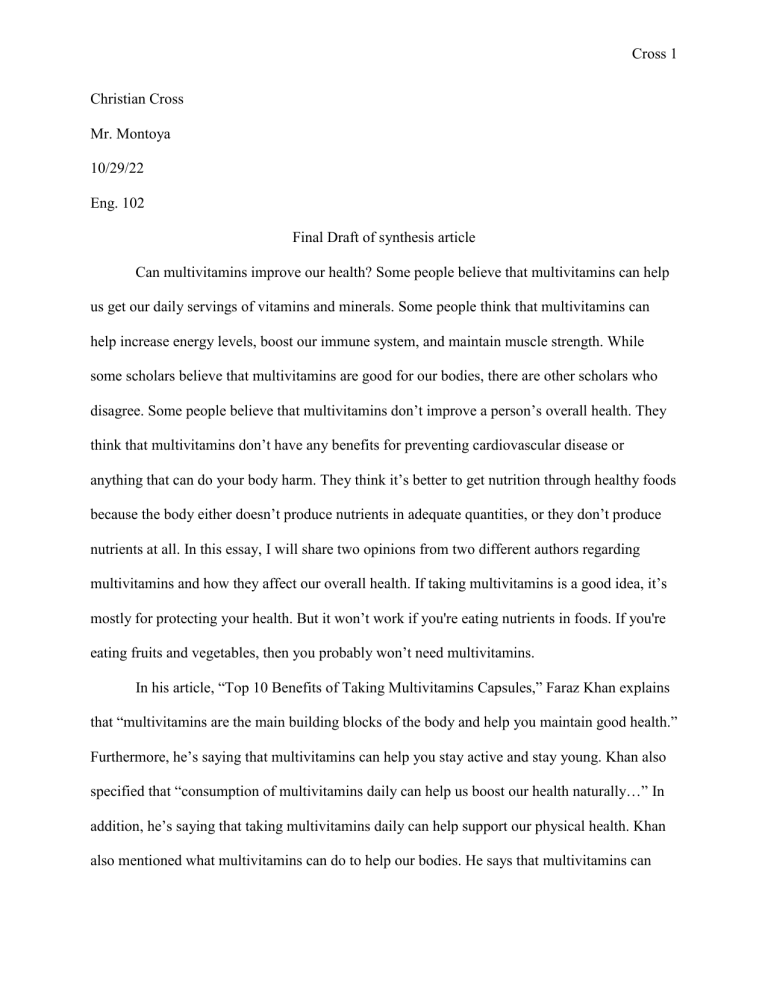
Cross 1 Christian Cross Mr. Montoya 10/29/22 Eng. 102 Final Draft of synthesis article Can multivitamins improve our health? Some people believe that multivitamins can help us get our daily servings of vitamins and minerals. Some people think that multivitamins can help increase energy levels, boost our immune system, and maintain muscle strength. While some scholars believe that multivitamins are good for our bodies, there are other scholars who disagree. Some people believe that multivitamins don’t improve a person’s overall health. They think that multivitamins don’t have any benefits for preventing cardiovascular disease or anything that can do your body harm. They think it’s better to get nutrition through healthy foods because the body either doesn’t produce nutrients in adequate quantities, or they don’t produce nutrients at all. In this essay, I will share two opinions from two different authors regarding multivitamins and how they affect our overall health. If taking multivitamins is a good idea, it’s mostly for protecting your health. But it won’t work if you're eating nutrients in foods. If you're eating fruits and vegetables, then you probably won’t need multivitamins. In his article, “Top 10 Benefits of Taking Multivitamins Capsules,” Faraz Khan explains that “multivitamins are the main building blocks of the body and help you maintain good health.” Furthermore, he’s saying that multivitamins can help you stay active and stay young. Khan also specified that “consumption of multivitamins daily can help us boost our health naturally…” In addition, he’s saying that taking multivitamins daily can help support our physical health. Khan also mentioned what multivitamins can do to help our bodies. He says that multivitamins can Cross 2 help increase energy levels when we feel a bit weak. Khan also said multivitamins can boost the immune system. He mentioned that it keeps the heart healthy because “the heart is a vital organ of the body and keeping it healthy is necessary.” Multivitamins can help with eye health to improve your eyesight and age-related macular degeneration that may cause permanent eye damage. They also help maintain muscle strength by giving muscle mass support and providing structural strength. Multivitamins can reduce cancer risk to get rid of any type of cancer. They can enhance brain functions to help bring back their memory. Multivitamins can lessen stress and depression to help reduce any anxiety that’s going on in the brain. Lastly, it’s also good for healthy hair because hair can be used for some care in cold seasons. While Khan believes that multivitamins can be beneficial for our health, the author by the name of Bob Curley, believes that multivitamins are not beneficial to our health. In his article, “Multivitamins Don’t Provide Many Health Benefits,” Curley explains that “multivitamins and mineral supplements don’t improve a person’s overall health…” Furthermore, he’s saying that we should play it safe on multivitamins so that it doesn't ruin our health. What that means is that nutrients in foods are a better solution to help give your body the vitamins it needs. Curley suggested that “you're better off getting your nutrition through healthy foods.” He articulates that nutrition in healthy foods is the way to a healthier lifestyle. Curley says that you are what you expect, he thinks that people taking multivitamins are normally more optimistic. What he’s explaining is that there are positive outcomes because people who take multivitamins expect to be healthier than people who don’t take multivitamins. He prefers nutrition in foods more than multivitamins. And then he thinks that multivitamins are just as good as eating rocks. In other words, he’s basically meaning the way multivitamins taste. Cross 3 Faraz Khan and Bob Curley can agree with how taking multivitamins can be healthy. Khan’s article explains that “multivitamins are essential nutrients that our bodies need for healthy functioning.” Even though Curley still thinks that multivitamins have no significant health benefits, he believes that “taking a multivitamin daily is a healthy thing to do.” That’s one similarity that they have in common. They believe that taking multivitamins can be beneficial for our health. Then, they’re also agreeing in both their articles on nutritional supplements. Khan specifies that “nutritional and dietary supplements are not meant to replace healthy foods.” Curley is on the same page, he specifies that “multivitamins are no substitute for a healthy, balanced diet.” Furthermore, they’re saying that multivitamins cannot replace nutrients in foods like fruits and vegetables. Here, they can also agree on deficiency in taking multivitamins. Khan specified that “multivitamins should be taken only when there is a deficiency…” and Curley specified in his article that “diet matters for good health, and multivitamins matter when there is a known deficiency.” Here, they agree that you should take multivitamins when there’s a deficiency. Unless there’s a deficiency going on, you can still follow your normal diet as it pertains to all essential nutrients. But one difference is that Khan and Curley talked about vitamin D in their articles. Khan specifies that “vitamin D is known for strengthening the immune system.” But Curley is against vitamin D, he said that “Vitamin D can cause overall immune deficiencies like obesity and type 2 diabetes.” Ultimately, multivitamins can be a good thing if a healthy diet is a part of someone’s daily life, but multivitamins won’t be a good thing if people rely only on them for their nutrition. The most important thing is that both authors disagree on whether multivitamins are healthy or not. Khan specified that “A regular course of multivitamin capsules can help you regain your energy.” What he is saying that what help you regain your energy is taking the right doses of multivitamins. Taking the wrong doses of Cross 4 multivitamins can lead to fatigue and sickness. Curley mentioned in his article that “there’s no substitute for food sources.” In other words, Curley is saying that nutrients in foods are a better way of regaining your energy. So, Khan is basically talking about how multivitamins can boost up energy in our bodies, while Curley is saying how we get energy from nutrition in foods. Each side of the argument has its strengths and weaknesses. Faraz Khan has great points about the benefits of taking multivitamins. One of his strengths is listing all the health benefits that multivitamins have on our bodies. For instance, a few health benefits that Khan listed are increasing energy levels, boosting the immune system, maintaining muscle strength and reducing stress and depression. Faraz Khan wants us to understand that it’s important to know what’s in multivitamins. And some of the positive outcomes it has on our bodies, and our minds. He gives out details of what multivitamins contain. Like he mentioned in his article that “it [multivitamins] contains various vitamins along with minerals.” Khan gave out supplements for us to know what multivitamins can do to help us physically. He gave facts and support on what multivitamins can do for our bodies. But he’s not a doctor and so he advises us to read it to go see an actual doctor even though what he puts down is true, but he doesn’t have the credentials to advise what each individual needs because he’s not a doctor. That’s one weakness he has in his article. Now Bob Curley has some strengths and weaknesses in his article. Even though he’s against multivitamins, one of his strengths is that multivitamins can decrease the chance of having diseases. Curley specified in his article that “daily intake of a multivitamin results in a small, but statistically significant decrease in diseases like cancer.” Curley wanted us to know that multivitamins can help reduce diseases that people were unaware of in their bodies. Curley’s sources are natural. The good thing about his article is that he gave some interviews. He Cross 5 interviewed doctors, specialists, medical assistants, and Harvard medical assistants about multivitamins. He interviewed a nutritional therapist by the name of Evie Whitehead, and she told him that “my [her] approach was always looking at food first to cover nutrients needs.” With that, his article was extremely credible. His weakness is like Khan’s weakness because both authors are not doctors. They may have got some good advice on multivitamins, but they’re just giving out suggestions to go see a doctor to advise you what our body needs. Neither side has won in their articles because neither are doctors. Both sides can agree on how nutrients in foods can’t be replaced by multivitamins. Furthermore, they’re saying that multivitamins can’t duplicate all nutrients in foods, like fruits and vegetables. They’re also saying that if you eat a healthy variety of foods like fruits and vegetables, then you probably won’t need multivitamins. But not everybody can handle a healthy variety of foods. Both sides can also agree that taking multivitamins is important for your health. Furthermore, they’re specifying that multivitamins can improve your health. All in all, multivitamins are a great way to improve our health. As Khan mentioned in his article, they help “increase energy levels, boost our immune system, and maintain muscle strength.” By knowing what your body needs, multivitamins can add more nutrients to your body. When taking multivitamins, it’s important to know that multivitamins can’t replace certain nutrients in foods. So, multivitamins can be good for sustaining your health, but multivitamins can’t be good if you're already on your healthy diet. For the people who are on a consistent healthy diet, it is advised to stick with the nutrients you get from food. Bob Curley saying that everyone’s better get nutrients from foods. And some people take multivitamins when there's a deficiency. Like some people have an iron deficiency, causing people to be less active, and lethargic. So, we must watch for multivitamins because health is the biggest reward of life. Cross 6 Work Cited Khan, Faraz. Top 10 Benefits of Taking Multivitamin Capsules, PharEasy 10 Nov. 2022, pharmeasy.in/blog/benefits-of-taking-multivitamin-capsules/. Accessed 26 Nov. 2022. Curley, Bob. Multivitamins Don’t Provide Many Health Benefits, Researchers Say, Healthline, 17 Nov. 2022, www.healthline.com/health-news/multivitamins-dont-provide-manyhealth-benefits-researchers-say/. Accessed 26 Nov. 2022.
